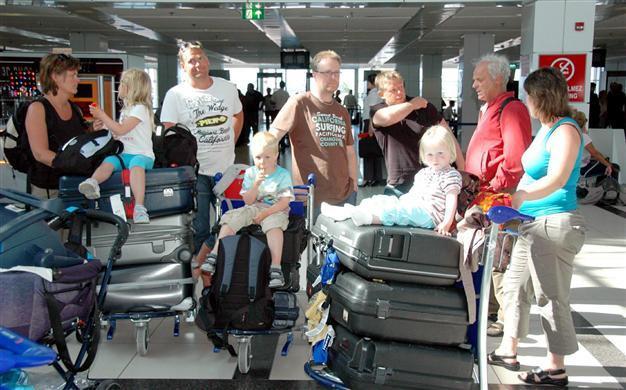Turkey to pay for jet fuel to keep Russian tourists coming
Turan Yılmaz ANKARA

DHA Photo
The government is planning new incentives for tour operators and airlines, as part of measures to boost tourism income amid problems in neighboring countries, particularly the economic crisis in Russia and the depreciation of the ruble.The related ministries held a special meeting on the issue last week, due to concerns about the drop in early bookings, Prime Minister Ahmet Davutoğlu said on Feb. 3, unveiling a raft of new measures.
“Tourism is one of the leading industries in Turkey, but it has been said that we might face serious problems in tourism this year,” Davutoğlu said.
As part of the new measures, Turkey will grant $6,000 to all passenger planes from Russia and Iran for the next two months as a contribution into their fuel spending.
“This will prevent the cancellation of flights,” Davutoğlu said, adding that this would also ease the burden for tour operators.
He added that the operators would also enjoy a generous credit window.
Başaran Ulusoy, the head of the Association of Turkish Travel Agencies (TÜRSAB), said the support would help meet the sector’s expectations in a rocky period.
“Supporting planes means supporting tour operators. This will have a direct effect on consumer prices. We have also told officials that passport-free crossing from these two countries [Russia and Iran] is needed, but of course this is a mutual issue for all the countries,” Ulusoy said.
However, many sector leaders have suggested that such passport-free travel is impossible due to security concerns.
On Jan. 10, Hürriyet quoted Mehmet Ersoy, the chairman of tour operator Etstur, as suggesting that Turkey should compensate the costs of fuel for planes arriving from Russia in order not to lose out on this large market. Turkey receives around 4.4 million Russian tourists every year, especially in its sun-soaked southern destinations in the south.
Ersoy said the government’s latest decision was “important,” adding that $6,000 amounts to around half of the fuel costs of a mid-sized plane for two months.
“But the fuel issue does not solve everything. The planes and the tour operators should also take responsibility. It is mainly Turkish operators who bring Russian tourists to Turkey. But the financial support will make them totally concentrate on Turkey,” he said.
The crisis in Europe may create opportunities for the Turkish tourism businesses if airlines reflect the fall in oil prices on their ticket fees, Ulusoy had earlier said at a sector event organized by daily Hürriyet on Dec. 22.
Turkey’s tourism income increased by 6.2 percent to $34.3 billion in 2014, the Turkish Statistics Institute (TÜİK) announced on Jan. 30.
However, income from tourism fell to $7.67 billion in the last quarter of last year, down 1.3 percent from the same period in 2013.
The total number of visitors increased 5.6 percent from the previous year, to 41 million in 2014, according to the data. Around 86.6 percent of the people visiting the country were foreigners, while 13.4 percent were Turkish citizens who reside abroad.
















